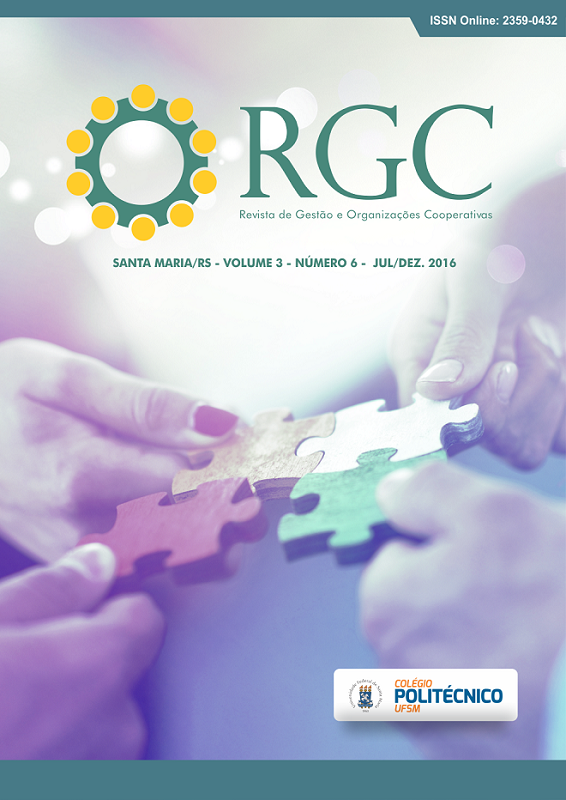Economic and financial performance of cooperatives: the self-management monitoring program of the Paraná State agribusiness cooperatives
DOI:
https://doi.org/10.5902/2359043224144Keywords:
economic-financial performance, financial indicators, management of agribusiness cooperativesAbstract
This article presents the contributions of the Monitoring Program of self - management process of cooperatives in the state of Paraná - Brazil. This is a program promoted by the Organization of Cooperatives of Paraná (OCEPAR), which, considering the specific legal and operational aspects of this type of organization, has adapted some indicators of economic and financial performance. It is presented its history and described its main characteristics as well as the adjustments made in the capital structure indicators, the Kanitz thermometer and the creation of the internal liquidity indicator. This is a descriptive research on its purpose; of hypothetical examples regarding the strategy approach to the problem; secondary data regarding the data collection process; longitudinal study regarding the temporal amplitude of data collection (Balance sheets of agricultural cooperatives from 1998 to 2013) and qualitative regarding the methods of analysis. A contribution of this program was the support, with technical data, for constructing the state scenario that originated the programs of support to the cooperatives, highlighting the Program of Revitalization of Cooperatives of Agricultural and Livestock Production (RECOOP), Cooperative Development Program for Value Aggregation Agricultural Production (PRODECOOP) and the Capitalization Program of Agricultural Cooperatives (PROCAP-AGRO).Downloads
References
Assaf Neto, A. (2002). Estrutura e Análise de Balanços: um enfoque econômico financeiro (7a ed.). São Paulo: Atlas.
Barroso, M. (2001). Ciclo de vida das cooperativas. Preços Agrícolas – Mercados e Negócios Agropecuários, 172, 11-15.
Bialoskorski Neto, S. (2001). Agronegócio cooperativo. In Batalha, M. O. (Ed.) Gestão Agroindustrial (pp. 628-655). São Paulo: Atlas.
Cook, M. L., Iliopoulos, C., Chaddad, F. R. (2004). Advances in cooperative theory since 1990: a review of agricultural economics literature. In: Hendrikse, G. W. J. (Ed.), Reestructuring Agricultural Cooperatives (pp. 65-88). Amsterdan: Rotterdan School of Management.
Ferreira, L. C. (2002). O dilema entre a especialização e a diversificação em uma cooperativa agrícola. Dissertação de mestrado, Programa de Pós-graduação em Administração, Universidade Federal do Rio Grande do Sul, Porto Alegre, Brasil.
Gitman, L. J. (2010). Princípios de administração financeira (12ª ed.). São Paulo: Pearson.
Jerônimo, F. B., Maraschin, A. F., Silva, T. N. (2006). A gestão estratégica de sociedades cooperativas no cenário concorrencial do agronegócio brasileiro: estudo de caso em uma cooperativa agropecuária gaúcha. Teor. e Evid. Econ., 14 (26), 71-89.
Kaick, G. van. (2004). Early milestone for cooperative self-management. In: Brazilian cooperativism: the conquest of autonomy (pp. 23-28). USAID: ACDI/VOCA. Recuperado em 30 de março, 2014, de
Kanitz, S. C. (1976). Indicadores contábeis financeiros - previsão de insolvência: a experiência da pequena e média empresa brasileira. Tese de livre docência em contabilidade, Faculdade de Economia e Administração, Universidade de São Paulo, São Paulo, Brasil.
Koslovski, J. P. (2004). Autogestão nas cooperativas: liberdade com responsabilidade (3ª ed.). Curitiba: SESCOOP-PR.
MAPA - Ministério da Agricultura Pecuária e Abastecimento. Estatísticas e dados básicos da economia agrícola. Recuperado em 2 de junho, 2014, de www.agricultura.gov.br/vegetal/estatisticas
Marion, J. C. (2012). Análise das demonstrações contábeis: contabilidade empresarial (7ª ed.). São Paulo: Atlas.
Martins, G., Mafioletti, R. L., Turra, F. E., Monteiro, A. A., Krinski, S. (2014). Agro: conjuntura e cooperativismo. Curitiba: OCEPAR-SESCOOP/PR.
Matarazzo, D. C. (2003). Análise Financeira de Balanços: Abordagem Básica e Gerencial (6a ed.). São Paulo: Atlas.
Moreira, V. R. (2009). Gestão dos Riscos do Agronegócio no Contexto Cooperativista. Tese de doutorado, Escola de Administração de Empresas de São Paulo, Fundação Getulio Vargas, São Paulo, Brasil.
OCEPAR - Organização e Sindicato das Cooperativas do Paraná. (2013). Revista Paraná Cooperativo, 9 (12), pp. 137 – 152.
Padoveze, C. L. (2000). Contabilidade Gerencial: um enfoque em sistema de informação contábil (3a ed). São Paulo: Atlas.
Pinho, D. B. (1986). A cooperativa: associação de pessoas e empresa econômica. In Pinho, D. B. (Ed.) A empresa cooperativa: análise social, financeira e contábil. São Paulo: Coopercultura.
Silva, E. S. (2005). A eficiência econômica e social em cooperativas do setor pecuários em Pernambuco. Custos e @agronegócio online, 1 (2), jul/dez.
USDA. United States Department of Agriculture. Agricultural Cooperative Service. (1993). What are patronage refunds? Recuperado em 22 de março, 2007, de Cooperative Information Report Web site: http://www.rurdev.usda.gov.
Downloads
Published
Versions
- 2022-05-30 (2)
- 2017-03-14 (1)
How to Cite
Issue
Section
License
Copyright (c) 2017 Revista de Gestão e Organizações Cooperativas

This work is licensed under a Creative Commons Attribution-NonCommercial-ShareAlike 4.0 International License.
Authors who publish in this journal agree to the following terms:
- Authors retain copyright and grant the journal the right of first publication, with work simultaneously licensed under the Creative Commons Attribution License that allows the sharing of work with acknowledgment of authorship and initial publication in this journal.
- Authors are authorized to enter additional contracts separately for non-exclusive distribution of the version of the work published in this journal (eg, publishing in institutional repository or as a book chapter), with acknowledgment of authorship and initial publication in this journal.
- Authors are allowed and encouraged to post and distribute their work online (eg, in institutional repositories or on their personal page) at any point before or during the editorial process, as this can bring about productive change as well as increase impact and impact. citation of published work (See The Effect of Free Access).







